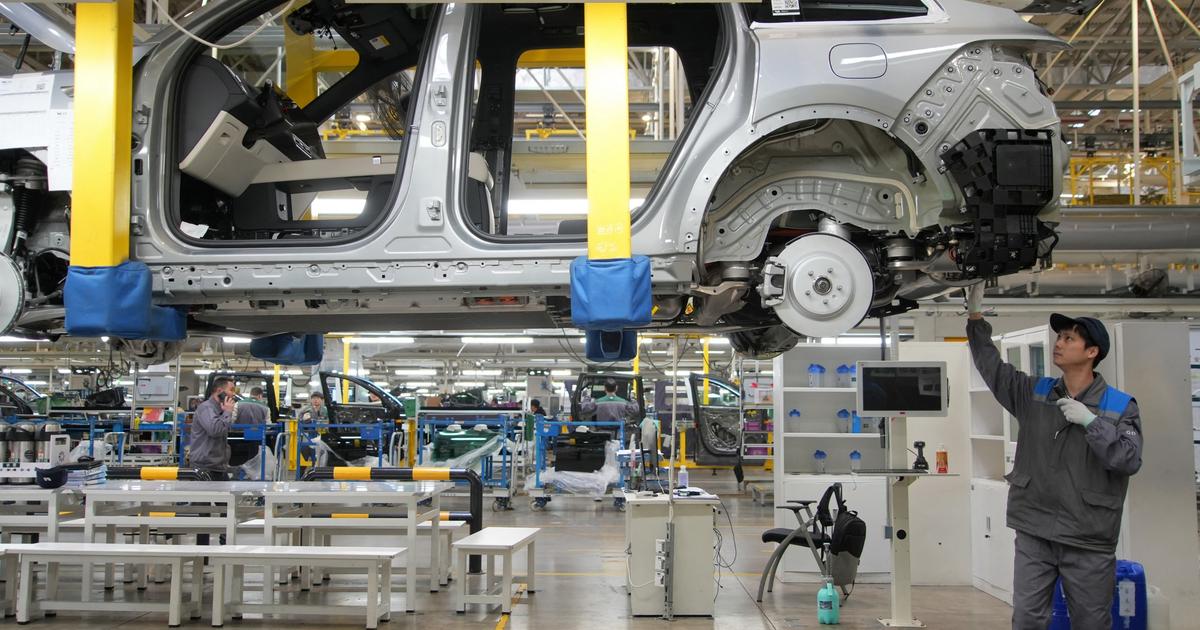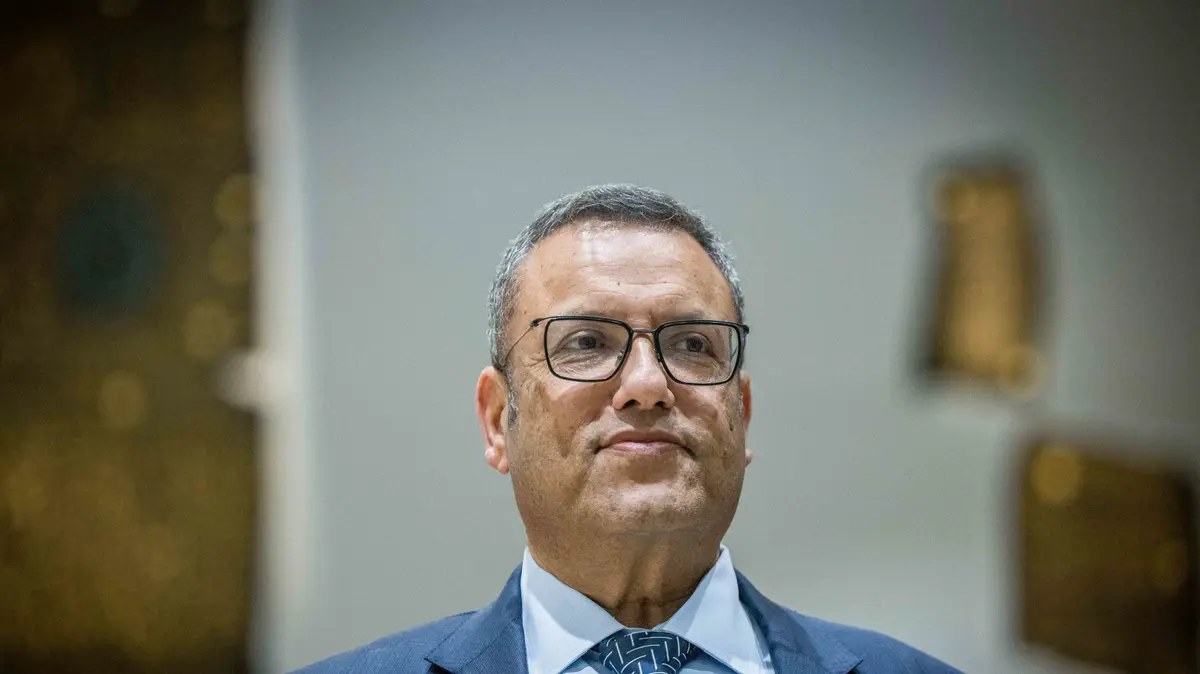The disruptive party
What a duel, what a speech battle, the
debate in the Bundestag
faction
of the CDU and CSU was another episode in a power struggle whose constellation is absurd:
With Markus Söder as candidate for chancellor, the CDU would have a
good chance of remaining a strong party
and of appointing the chancellor after the federal election in September.
With Armin Laschet as candidate for chancellor,
slipping into the opposition would
not be a doomsday scenario, but a realistic option.
That's the way it is today, undeniable.
And yet it is still more likely that Laschet will win the duel against Söder than the other way around.
What does that say about politics?
The structures of a party can lead to its
self-
dwelling.
Markus Söder
leads in the polls
, according to a survey by the "Bild" newspaper, he is even more popular than the Chancellor.
Markus Söder is the
favorite in the Bundestag
faction, around 40 MPs spoke out for him yesterday, 22 for Laschet.
For many in the Union, Markus Söder is a
projection screen for a promising future
, and not just since yesterday.
Enlarge image
Duelists Söder and Laschet
Photo: Michael Kappeler / dpa
I remember the CDU party congress in November 2019, it was a rather dreary event with a party chairman Annegret Kramp-Karrenbauer, who at the time, two months before her announcement to withdraw from the party leadership, was already looking tired and at the party congress the vote of confidence posed.
The CDU already seemed unsettled, but then Söder, the big chairman of the little sister, came and gave a Söder speech, which was actually only supposed to be a greeting.
Then he was cheered like Jesus when he entered Jerusalem.
He was the only one who was able to create a spirit of optimism and the feeling: It's going up, we can do it. And the Chancellor sat silently next to it.
It was the moment when the CSU boss made
his first discipleship in the CDU
.
Then in the pandemic it got bigger every day.
Now Söder has taken a path that has already led others to success.
Sebastian Kurz, for example - or Donald Trump.
He took an offensive against the caste of party functionaries, against the establishment and instead presented himself as a tribune of the people, as a
grassroots
lawyer, a
conservative grassroots fighter
.
Incidentally, before Söder, Friedrich Merz had sought this path in order to be successful in the Union.
He had failed, however, because nobody really believed it.
And Söder?
It is hard to imagine how Söder is going to become a candidate for chancellor.
Because the price for the leadership of the CDU would be high: You would have to drop your own candidate and ideally yourself too.
Why would she want to pay that price?
But Markus Söder, who is closest to himself when it comes to questions of power, will ask himself why he should give in when the facts show that he has an advantage?
And if he gives in, at what price?
Or does he just not give in?
Markus Söder and Armin Laschet want to consult and
decide by the end of the week
.
No matter how it turns out, the CDU is damaged from this duel - and so is its chairman.
Laschet and Söder in the Union faction: The discharge
How are the students?
They are one of the hardest hit by the corona crisis: the
students
who have
been denied
the
essential experience of learning together
in the all-important (and exciting) sociotope called school for months, at least in large part.
Enlarge image
Students in corona times
Photo: Matthias Bein / dpa
It fills me with
sadness and anger to
watch my daughter's first year of school, which she had been looking forward to, rush past her and us, between half-day face-to-face classes twice a week and video sessions every few days, knowing full well that it was going to happen there were no reasonable alternatives.
Or is it?
Could we have given our students better learning if the schools had been better positioned?
For sure.
The Organization for Economic Cooperation and Development (OECD) asked around in the states.
Andreas Schleicher, Director of Education at the OECD, points out three findings:
Education systems in which teachers are used to design innovative learning environments, which are characterized by responsibility and creative possibilities on site, which use resources where they are most needed, have come through the crisis well even in difficult infection situations.
New technologies have become the lifeline of education.
Countries that have not only relied on online platforms but also use television, mobile telephone technology and other forms of communication in a differentiated manner in order to reach all school groups have been particularly successful.
It is crucial for equal opportunities that all students always have a reliable and daily contact person in the school, even when schools are closed, and that there are many and regular communication channels with which the schools can reach all parents.
Germany still has a lot to learn, says Schleicher.
The results of the OECD survey will be presented today at 11 a.m.
Corona mutants in daycare centers and schools: "Take good care of yourself and your children"
Wirecard and the secret services
A success story based on lies and deceit, unscrupulous managers with connections to war zones and the secret service environment, in the end a successful flight by plane to Belarus, with the help of a former member of a right-wing populist party and a former intelligence service employee: the history of Wirecard has everything what a film needs.
That is why it is being made into a film, and several productions are being planned.
Now it is enriched by a few bizarre details, as my colleagues
Martin Hesse, Fidelius Schmid and Gerald Traufetter will
report on spiegel.de today.
You have the ten-page report by the special investigator Wolfgang Wieland, which was appointed by the parliamentary committee of inquiry of the Bundestag to Wirecard.
Enlarge image
Search for ex-board member Jan Marsalek (in Hamburg)
Photo:
Daniel Bockwoldt / dpa
Jan Marsalek, the then Chief Operating Officer,
asked
Wirecard's
former product technology director in the summer of 2019 for a
complete annual data set of Wirecard's business partners
, which he claimed to be forwarded to the Federal Intelligence Service (BND).
His colleague on the board seemed to think nothing of it, after all, the BND was also a customer of the payment processor Wirecard.
The board apparently did not ask itself why the German foreign secret service should be interested in customer data on such a large scale.
According to the BND, the information had not been ordered, nor did it reach him.
"The BND verifiably rules out having received such a sentence, so the question remains who received it," says Wieland's report.
Did Marsalek pass on the explosive material - including account and credit card details of probably thousands of customers - to other secret services?
Or to his dubious business friends who are said to have been involved in the great Wirecard fraud?
These are just a few of the many questions that still arise in this case.
Today at 10 o'clock the representatives of the Union parliamentary group will report on the work of the committee of inquiry.
Tomorrow two interesting witnesses are invited: Klaus-Dieter Fritsche, the former secret service representative Angela Merkels, who worked as a consultant for Wirecard after his retirement.
And Bernd Schmidbauer, also ex-intelligence coordinator in the Chancellery, who met Marsalek in Munich in 2018.
It could be like reading a script.
Secret chats, absurd deals: Inside Wirecard
Loser of the day ...
... is Federal Health Minister Jens Spahn, who has once again received bad news for the German vaccination campaign, for which he is not to blame.
There were again worrying
cases of thrombosis after a corona vaccine was awarded
, this time the US manufacturer Johnson & Johnson was hit.
Enlarge image
Jens Spahn
Photo: POOL / REUTERS
Dangerous blood clots were found in six US women a few days after vaccination with Johnson & Johnson.
A rare side effect in view of the 6.8 million people who have received the serum in the USA so far, but the pharmaceutical giant reacted promptly: Until the investigation of the thrombosis cases has been completed, a
“precaution” should be taken to take a “break” from the vaccinations
. Johnson & Johnson announced that the launch of its vaccine in Europe would be delayed.
Since Johnson & Johnson in Germany should become the second most important pillar of the local vaccination campaign in a few weeks, there is now a threat of further
delays in the already sluggish vaccine supply
.
The only consolation for Jens Spahn: he already knows this kind of bad news.
Delayed delivery: Germany's vaccination campaign cannot do without Johnson & Johnson
Advice of the day
How do we want to talk to each other?
We are currently discussing this question with our readers and experts as part of the SPIEGEL project Republic 21.
Today at 9 p.m.
on the
Clubhouse platform, the
specific question of how
young people can
and whether or not they
can participate more in important decisions
it would make sense to lower the voting age to 16 years.
My colleagues
Silke Fokken, Kristin Haug and Armin Himmelrath
talk about this
with Dario Schramm
, Secretary General of
the National Schoolchildren
Conference, and
Selma Konrad
, Chairwoman of the Thuringian State Schoolchildren Council.
If you want to be there, click here.
Yesterday evening my colleague
Melanie Amann had
the SPD health expert Karl Lauterbach as a guest in our television studio in Berlin.
They talked about the increasingly polarized public debate in the corona crisis and how this heated mood makes the search for solutions difficult.
You can find a short summary of the evening on our website today.
We invited SPIEGEL subscribers to the event by e-mail, who could take part virtually and ask questions.
If you want to be part of such events in the future and are not yet a subscriber, just give SPIEGEL a try.
The latest news from the night
Biontech or Moderna for a second vaccination according to AstraZeneca:
The federal and state health ministers have complied with the recommendation of Stiko: First vaccinated under 60-year-olds with AstraZeneca should switch to an mRNA vaccine for the second vaccination
Bayern elimination in Paris - so close and yet so far:
PSG had chances for three games, but the 0: 1 was enough for them to advance.
Bayern failed honorably, for three players it is a farewell after a long time
"Desperados III" honored as the best German video game:
the German Computer
Game Prize was awarded
in an online gala.
Two important awards went to a studio from Munich that refused to accept an award in 2017
The SPIEGEL + recommendations for today
Meat substitute made from pea and rice proteins: The billion dollar business with veggie burgers
Investing In Cryptocurrencies: What You Can Learn From The Bitcoin Billionaire
A lawyer and his worst case: Why three German judges flew halfway around the world
More and more, more and more fatty: How Corona makes us stress-eaters
I wish you a good morning and a successful day!
Your Martin Knobbe


/cloudfront-eu-central-1.images.arcpublishing.com/prisa/GSAG3AFDE5GZ7CR5RU42LT63UM.jpg)






